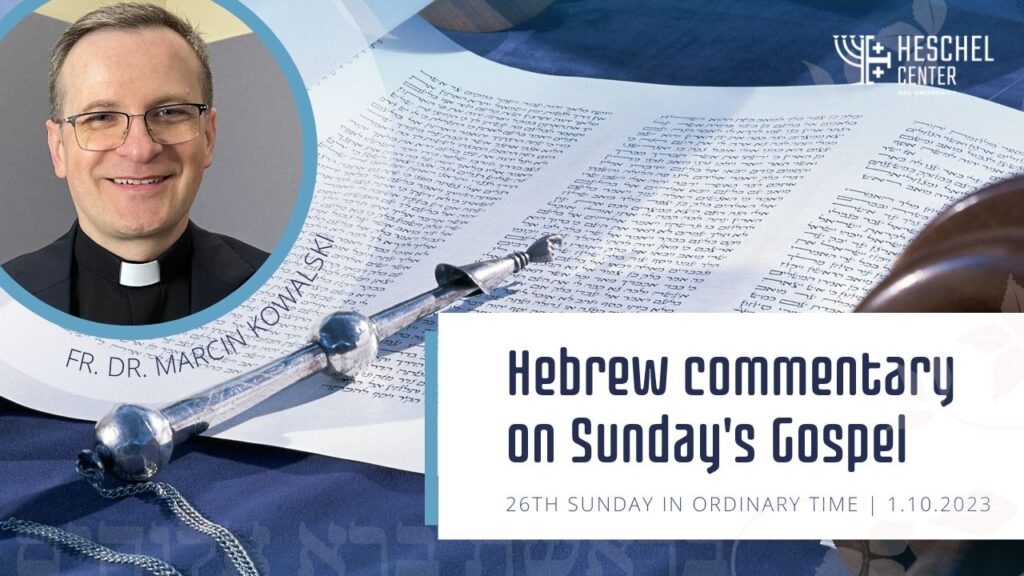Sons of the One Father – Jews and Christians. Ancient Interpretations of Jesus’ Parables
In the Sunday parable, Jesus tells of the owner of the vineyard and his two sons. The first one, whom father asks to work in the vineyard, responds positively but then gives up. The other first refuses but then fulfills the father’s request. Ancient interpretations see Israel as the first son, while the second symbolizes […]

In the Sunday parable, Jesus tells of the owner of the vineyard and his two sons. The first one, whom father asks to work in the vineyard, responds positively but then gives up. The other first refuses but then fulfills the father’s request. Ancient interpretations see Israel as the first son, while the second symbolizes converted pagans and sinners, the future Church. “Israel and the Church are united by seeking and doing God’s will. Only through faith, supported by the testimony of love and good deeds, do we enter the Kingdom of God together,” writes its biblical scholar Fr. Marcin Kowalski, professor at the Catholic University of Lublin and director of the Heschel Center of the University in his commentary to the Gospel on 1 October.
Jesus’ parable of the father, his sons, and the vineyard fits into the Jewish cultural context and realities of the time. Its crucial moment is the father’s inviting his sons. “The Father, symbolizing God, opens the door to his Kingdom, but first invites his children to earthly work in his vineyard,” explains the director of the Heschel Center of the Catholic University of Lublin.
The ancient interpretation of this Gospel parable sees in the son who, despite his initial willingness to go to the vineyard, did not ultimately go, sees Israel. “This reading is suggested by the Gospel of Matthew itself, in which Jesus tells the parable to the chief priests and elders, the leaders of the people, reproaching them later for not listening to the message of John the Baptist and not converting,” emphasizes the biblical scholar.
“The second son, the tax collectors, and prostitutes appearing later in the parable stand for pagans, people outside the people of the covenant, who nevertheless convert and enter the Kingdom of God,” writes Fr Marcin Kowalski, recalling the oldest interpretations referring to the second son who, despite his initial reluctance, went to work in his father’s vineyard. “The fact that the pagans and sinners are going into the Kingdom of God ahead of Israel does not mean that Israel does not enter there,” reminds Fr Kowalski, emphasizing the biblical premises about the conversion of all Israel at the end of time.
There is also another ancient interpretation, attested to by Origen and Jerome, according to which the parable of the two sons takes on a vast, universal meaning. “The first son who respectfully responds to the Father +Lord+, but does not obey Him, means all those who worship God only with their mouths, not doing His will and not seeking good deeds. It is an empty, declarative, and sterile piety,” says the director of the Heschel Centre of the Catholic University of Lublin. “The second son seems to disrespect the Father, yet he eventually does his will and follows, as Jesus says, the path of righteousness,” the biblical scholar adds.
The entire commentary is available on the website of the Heschel Center of the Catholic University of Lublin.
Related

Pope Francis spent a peaceful night
Exaudi Staff
02 March, 2025
1 min

Pope Francis has had a peaceful night
Exaudi Staff
25 February, 2025
1 min

What should the boyfriend or girlfriend I should find be like?
Patricia Jiménez Ramírez
24 February, 2025
4 min

The Pope spent a quiet night at Gemelli
Exaudi Staff
23 February, 2025
1 min
 (EN)
(EN)
 (ES)
(ES)
 (IT)
(IT)

